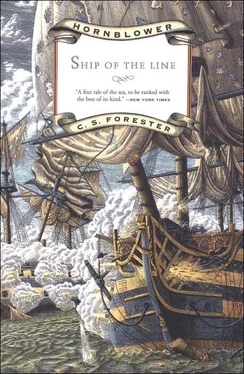“Send them on board with the other stores,” said Hornblower, at last.
“Aye aye, sir,” said Cavendish, allowing no shade of expression in his face to hint at his conviction that mules were far more trouble than guns to coax into small boats and to heave up into ships.
The work went on. One of the guns, with the malicious ingenuity of all its tribe, fell over and dismounted itself during its passage down the gully, but the men did not allow the accident to delay them long. With crowbars they heaved the huge mass of iron down the slope and over the sand, rolling it, like a barrel, along the pier and into the long boat awaiting it. The ships had tackle which would make light of its weight and would remount it in no time. Hornblower gave up his horse to be led to the water’s edge and to be coaxed into a boat, while he walked away along the summit of the cliff to take his stand on a high point from which he could overlook both the beach and the head of the gully where Laird would make his final stand.
“Run to Major Laird,” he said to Brown. “Tell him everything is on the beach now.”
Ten minutes later events suddenly moved with a rush. Brown must have met the marines in their final movement of retreat, for the scarlet uniforms came pouring back up the path, to take up their position along the summit of the cliff, their line reaching nearly to where Hornblower was standing. The French were hard on their heels; Hornblower could see their uniforms moving through the scrub, and the musketry popped furiously along the line.
“Look out, sir!” called Longley, suddenly. He pushed his captain violently in the ribs, jostled him off the flat rock on which he was standing. Hornblower heard two or three bullets pass over his head as he struggled to keep his footing, and at the same moment a group of French infantry, fifty or more, came bursting out of the bush, running hard for them. They were between Hornblower and the nearest marines; the only way of escape was down the steep face of the cliff, and he had no more than a second in which to make up his mind to take it.
“This way, sir!” squeaked Longley. “Down here!”
Longley dropped like a monkey to narrow ledge below, beckoning him down with waving arms. Two blue-coated infantry men were close upon him, their bayonets levelled; one of them was shouting something which Hornblower could not understand. He turned and jumped after Longley, his feet just reaching the ledge a dozen feet below; and he swayed there with a vertical drop of over a hundred feet below him. Longley caught his arm, and, leaning outwards, scanned the descent keenly and yet with a nightmare coolness.
“That is the best way, sir. You see that bush? If we can reach that, we ought to get over there. There’s a bit of a gully there joining the big one. Shall I go first, sir?”
“Yes,” said Hornblower.
A musket banged over his head and he felt the wind of the bullet—the French were leaning over the top of the cliff firing down at them. Longley braced himself, and then leaped wildly along the face of the cliff, slid down it in a cloud of dust and fragments, and caught the stout bush he had pointed out to Hornblower. Then, moving cautiously away from it, he found an inequality on which to rest, and from there beckoned again to his captain. Hornblower tried to nerve himself for the leap, and then drew back. Another bullet—it actually struck the ledge close to his feet. Hornblower plunged heavily from the end of the ledge, turning his face to the cliff. He felt the rock tearing at his clothes as he slid. Then he crashed into the bush and grasped it madly, his feet seeking foothold.
“Now, over here, sir. Catch hold of that lump with your hands. Put your foot into that crack, sir. No! Not that foot! T’other one!”
Longley’s voice went up into a squeak like a bat’s in the excitement as he edged himself along the cliff and at the same time instructed his captain where to put his hands and feet Hornblower clung to the cliff face like a fly on a window pane. His hands and arms were aching already—the activities of two days and a night had already drained his strength. A bullet whacked into the rock between him and the midshipman, a chip which it displaced struck his knee a sharp tap. He looked down, and his head swam at the sight of the drop below him. In his exhausted state he felt he would gladly loose his hold and drop down to the quick death awaiting him.
“Come on, sir!” said Longley. “Not much more now, sir. Don’t look down!”
He recalled himself to sanity. Changing foothold and handhold inch by inch, he shuffled along in accordance with Longley’s instructions.
“Just a minute,” said Longley. “Are you all right, sir? Wait here while I go and have a look.”
Hornblower clung on with aching arms and legs. He kept his face against the cliff, stupid with fatigue and fear. Then he heard Longley beside him again.
“It’s all right, sir. There’s only one nasty bit. Get your feet down on to that knob, there. Where that bit of grass is.”
They had to get past a projecting boss in the face of the cliff; there was one awful second when Hornblower had no foothold, and with his legs dangling had to stretch to a new handhold.
“They can’t see us here, sir. You can rest a bit, if you’d like to,” said Longley solicitously.
Hornblower lay on his face in the shallow depression which grooved the cliff, conscious for a space of nothing save the cessation of strain. Then with a rush he remembered everything—his dignity, the work on the beach, the fighting on the summit. He sat up and looked down; with a solid lump of the cliff under him his head would stand that. The beach was clear of guns now, in the darkening evening, and only a few animals stood waiting their turn to be coaxed into the boats. Up above the firing seemed to have died down for a space; either the French had begun to despair of achieving anything further or they were gathering for a last effort.
“Come on,” said Hornblower, abruptly.
The rest of the descent was easy; they could slide and scramble all the way until he felt the welcome sand under his feet. A worried-looking Brown materialised here, his face clearing as he caught sight of his captain. Cavendish was standing supervising the despatch of the last cutter.
“Very good, Mr. Cavendish. The seamen can go next. Are the armed boats ready?”
“Yes, sir.”
It was nearly dark now, and the sky gave only a faint light when the marines began to pour down the gully and over the sand. The last shots in the long retreat were fired by the four-pounders mounted in the bows of the two longboats which lay nosing the sand while the final section of marines splashed out into the water to them. The long red tongues of flame lit up the dark masses of Frenchmen swarming down on to the beach, and the blast of grape which they had hurled was followed by a gratifying chorus of screams and cries from the stricken masses.
“A very handsome operation indeed,” said Major Laird from his seat in the stern of the longboat beside Hornblower.
Hornblower drooping in weariness was inclined to agree with him, although he was shivering with the chill of his soaked breeches, and his hands smarted from cuts and abrasions, and other parts of him pained him with saddlesoreness as if they were being held before a fierce fire. They rowed out over the silent sea to a ship strange with the whinnying of horses and smelling stable-like already.
Hornblower staggered on board; he saw the boatswain’s mate who held the lantern for him glance curiously at his ragged clothes and white face. He walked blindly past the dark line of horses and mules, picketed head and heel to the deck ringbolts, to the security of his cabin. He ought to make his report to the admiral—surely he could leave that until daylight. The deck seemed to be heaving under him rhythmically. Polwheal was there, and food was laid on the candle-lighted table, but Hornblower later could never remember eating any. Faintly he could remember Polwheal helping him into bed, and a vivid, clearcut memory always abode with him of hearing Polwheal, through the closed cabin door, arguing with the sentry outside.
Читать дальше









